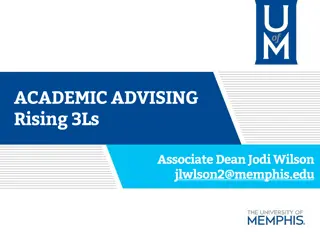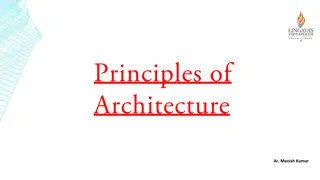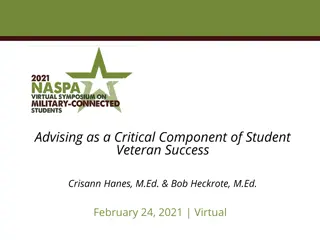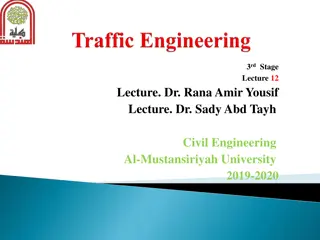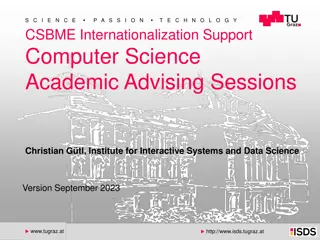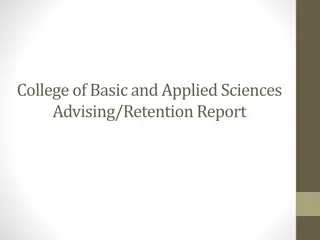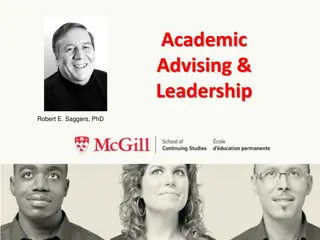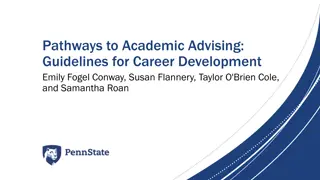Innovative Approach to Distance Education Advising at Unity College
Highly collaborative and relationship-focused advising model at Unity College's Distance Education program offers concierge support, faculty-student communication strategies, and close collaboration with academic deans. The program emphasizes consistency, warm hand-offs, and continuous support to ensure student success in a virtual learning environment.
Download Presentation

Please find below an Image/Link to download the presentation.
The content on the website is provided AS IS for your information and personal use only. It may not be sold, licensed, or shared on other websites without obtaining consent from the author.If you encounter any issues during the download, it is possible that the publisher has removed the file from their server.
You are allowed to download the files provided on this website for personal or commercial use, subject to the condition that they are used lawfully. All files are the property of their respective owners.
The content on the website is provided AS IS for your information and personal use only. It may not be sold, licensed, or shared on other websites without obtaining consent from the author.
E N D
Presentation Transcript
Advising in Advising in Distance Education at Unity College Distance Education at Unity College
What makes Advising in DE different? Highly collaborative One stop shop model High touch support
Director of Enrollment Management Team Structure Associate Dean of Retention and Completion Undergraduate Advisor Graduate Advisor Undergraduate Advisor Undergraduate Advisor
Advising is Relationships Concierges Students Faculty Academic Deans Instructional Designers Registrar Student Financial Services
Concierges Concierges are the primary contact for incoming students through the add/drop period of their first term Concierges complete Orientation calls, enroll them in their first course, help them understand financial aid and make their first payment --------------------- ADD / DROP --------------------- Student officially begins with their Advisor after Add/Drop, and stays with the same Advisor for the rest of their academic career Warm hand offs are critical Unique scenarios and outstanding student needs Consistency is critical so students have the same expectations, experience and information when transitioning
Faculty Both have the ability to create system alerts, providing critical information for student interaction and intervention Faculty will often reach out to advisors with student concerns, and vice- versa Take a team approach to communication (more is more) Clear lines of responsibility are in place: Student requests often overstep with Advisors seeking grade changes, extensions, etc. Important that advisors reiterate anything course, assignment, grade related needs to be directed to their faculty member Advisors may facilitate communication between faculty and student Accommodations are addressed by the Associate Dean and directly communicated with Faculty Shared goal of student success
Academic Deans Have a close working relationship with the Advising team to meet student needs Work closely with advising team on course roll out plans Approve course waivers/substitutions as necessary Field escalated student concerns about faculty Faculty and advisors may be involved in concerns about plagiarism, student conduct, etc. Academic Deans will be involved as necessary. Academic Deans are a primary resource for faculty, but student issues often will involve Advisors as well. When it comes to the student experience, there are no barriers between the Academic and Enrollment teams
Instructional Designers The ID team is responsible for all content in Canvas Coordinate the opening of course sections for a new term (in particular, EVPC 101 pre-course module). Technical feedback about a course (broken links, etc.) will be referred to the ID team who troubleshoots and fixes. Design feedback, both positive and negative, is shared when available Coordination with IDs allows us to continually improve the course experience for students
Registrar Transfer Evaluation is a critical component of student engagement Official evaluations inform how Advisors register students and set up academic plans Assistant Registrar troubleshoots special case student circumstances, concerns related to registration and grading, as well as keeps track of important information related to military benefits (VA). Produces enrollment verifications, prior approval transfer forms, other assorted official paperwork for DE students. Registrar collaboration ensures students receive the credits they expect, and allows us to provide a clear picture of the future.
Student Financial Services Continuous coordination with SFS on student concerns related to Financial Aid packaging, documents, scholarships, payment & billing. Our unique financial aid model requires extensive communication and explanation with students should they fail or withdraw from a course. Assist with set up payment plans and unique payment arrangements Shared data and thorough training allows us to speak with confidence about complex situations 95% / 5% rule A team approach and open communication provides students with relief finances are major concern and need to be handled delicately
The most important relationship for Advising! Students How we measure success: retention and completion Role of the Associate Dean is to ensure that the design of student services allows advisors to work effectively in support of their students success. Students will work with the same Advisor for the duration of their time at Unity. The advisor will be their primary point of contact for ANY issue that arises. We may not have the answer or be able to resolve immediately but are always the first line of support and will facilitate help from other areas.
Broad scope of communication 1 week prior to term start: Welcome email to NEW students, introducing the advisor, directing students to Pre-course Module in Canvas, reminder of next steps. 1 week prior to term start: Reminder email to RETURNING students, reminding them again of the term start, to check for required materials, make payments if necessary. Every Monday: Highlight important resources and information, such as TutorMe, TAO, withdrawal deadline, transfer evaluation information, future registration and schedule information, how to access student course evaluations, where to find required course materials.
What is High Touch Support? In addition to weekly emails, advisors communicate with students extensively via email, phone, text and Canvas. Advisors are expected to: Be familiar with courses and assignments Check on student progress week over week Communicate with students if they miss assignments or if their grades are of concern Track participation for six day (UG) or eight day (grad) attendance policy Process withdraws (by student request or administrative) and stop outs Register students for all of their courses Maintain the student s academic plan Utilize a variety of systems to track progress and maintain student records Manage start/end of term transitions
uAchieve Course planning, registration, academic plans, and degree audits. Place your screenshot here
Canvas module view Review of course layout and assignments
Dropout Detective module view Primary tool for student trends, risk identification and student intervention
Dropout Detective Notes Provides consistent tracking of student history
Assignments Detail of specific assignments, grades and status
Communication is consistent throughout the term, but the end of a term (and quick start to another) creates a peak workload for all advisors: Term Transitions Check all student grades. Determine if student needs to retake course. Change future registration as necessary. Monitor GPA for SAP. Explain financial aid implications if student failed or withdrew. Make sure any incompletes have been appropriately processed. Week prior to term start, initiate contact, with new and/or returning email. Reach out to stop outs to see if they are ready to return. For any returning students, advisors are responsible for payment arrangements/participation during add drop.
Recruitment Advisors are responsible for re-recruiting their students every term
Advising is Relationships Concierges Students Faculty Academic Deans Instructional Designers Registrar Student Financial Services
Thanks !! Any questions?



